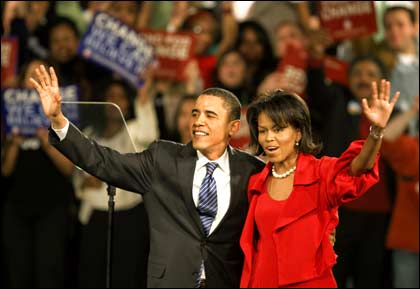The Fleeting Audacity of Inevitability

I admit I have never been drawn to Hillary Clinton. So when it appeared inevitable that she would be the Democratic Presidential nominee, I tried to talk myself into liking her. I knew she was very intelligent and had lots of experience, and I generally agreed with her ideology and policy positions, but I just did not feel comfortable with her. She seemed more calculating than genuine. When Bill was caught in the Monica mess, a lawyer friend of mine predicted Hillary would divorce him after his Presidential term expired. I did not agree with that prediction, but I do wonder how her career would be different if she had dumped him. Did she stay with Bill in spite of all his marital wanderings mostly because she loved him, or was it more for what he could do for her ambitions?
The plan of the Democrats was to have their candidate chosen on Super Tuesday in early February, confirming what the polls were showing, that Hillary Clinton was the inevitable choice. But here at Sense a year ago, our poll predicted unanimously [all three of us agreeing] that a black would be elected President before a woman. Let us remember from American history that black men got the right to vote more than fifty years before white women. White men, who have always held the reins of American power, in many ways identify more with black men than they do with white women. Black men were lynched for alleged crimes against white women not so much to protect the women as to protect the property rights of the white men.
Barack Obama has sent the audacious Clinton inevitability into free fall. Bill Clinton accelerated the fall with his campaign antics on behalf of his wife. Better amateur psychologists than me might be able to detect an element of intention on the part of the ex-President, based on some need to be one up on his wife, so that she will continue to feel she needs him. Imagine if Hillary had won, and then at the end of her Presidency she divorced Bill.
The Obama appeal starts from the overwhelming desire for change from Bush. His charisma, intelligence, oratorical skills and personal history all add to his appeal. His mixed ethnicity is the marble frosting. But he has made his campaign work by doing just what Hillary says she would do as President but has failed to do in her campaign. He has been following a well thought out plan, efficiently executed, disciplined and maintained. Through a glut of twenty debates, Barack has performed with acumen, which increased as the number of participants dwindled, culminating in his excellent showing on the last two against Hillary alone.
Hillary still gets sympathy from older white women who are upset to see yet another up and coming young man usurp what should have gone to the experienced woman with seniority. Hillary was supposed to be the admirable pioneering woman who would break through the ultimate glass ceiling. But as one young female black commentator said, it is hard to think of a white multi millionairess U.S. Senator whose husband was President for eight years, as an admirable underdog. And now that Hillary has in fact become the underdog, she has not only failed to gain any "root for the under dog" votes, but some of her long time supporters are turning away from her.
Next Tuesday, the Texas and Ohio primaries could be the final blow to Hillary. She had been hoping to win them big, but now is realistically hoping just to win both by even small margins, or maybe to win one, or maybe to come close in both. Barack has been winning the super delegate PR war as well as the battle over whether to count the boycotted Florida and Michigan results. The Clinton people have started talking about Pennsylvania in April as a firewall, but unless Hillary surprises everyone with strong victories in Texas and Ohio, the only wall that matters will be the one with the writing on it, "Barack Obama is the candidate of the Democrats".

